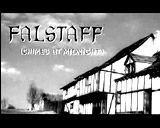
|
Chimes at Midnight (1965, Sp./Switz.)
(aka Falstaff or Campanadas a Medianoche)
In Orson Welles' last classic masterpiece, his personal
favorite film:
- the portrayal of William Shakespeare's recurring
character: the charismatic, corpulent thief/drunken scoundrel/adventurer
Sir John/Jack Falstaff (Orson Welles), who frequented the Boar's
Head Tavern for carousing and various criminal activities; Falstaff
had a father-son relationship with heir-to-the-throne Prince Hal
(Keith Baxter), the Prince of Wales, whose real disapproving father
was King Henry IV (John Gielgud) (who had just succeeded King Richard
II to the monarchy/throne)
- the great scene of the 1403 Battle of Shrewsbury
between King Henry IV and Henry "Hotspur" Percy (Norman
Rodway); the sequence began with knights being lifted by pulley onto
horseback; inappropriately-heavy armored, tubby-shaped Falstaff hid
in the bushes and waded through the muddy battlefield while other
armored men were swinging heavy weapons and slaughtering each other
during the futile and tragic struggle; Falstaff meekly watched and
cheered from the side throughout most of the conflict; the cowardly
Falstaff feigned his own death, and then opened up his helmet's visor
and declared: "The better part of valor is discretion"
- during the Battle, Prince Hal sword-dueled Percy to
the death; as Percy died, Prince Hal spoke: "For worms, brave
Percy; fare thee well, great heart!"; afterwards, Falstaff falsely
took credit for killing Percy, telling King Henry IV: "I swear
I killed him"
- following the death of King Henry IV, Prince Hal
was to be coronated as the new King Henry V (he was named Henry V,
succeeding his father King Henry IV); Falstaff attended the coronation
ceremony and fully expected to receive praise from his friend and
associate ex-Prince Hal, but he was wronged and disowned when Hal
decided to reform his ways: ("I have turned away from my former
self"); the new King Henry V betrayed and banished Falstaff
(who fell to his knees) during the coronation ceremony: (Falstaff: "My
King! My Jove! I speak to thee my heart!" King: "I know
thee not, old man. Fall to thy prayers! How ill white hairs become
a fool and jester! I have long dream’d of such a kind of man,
So surfeit-swell’d, so old and so profane. But, being awaked,
I do despise my dream. Make less thy body hence, and more thy grace.
Leave gormandizing, now the grave doth gape for thee thrice wider
than for other men. Reply not to me with a fool-born jest. Presume
not that I am the thing I was. For God doth know, so shall the world
perceive, that I have turned away my former self. So will I those
that kept me company. When thou dost hear I am as I have been, approach
me, and thou shalt be as thou wast. The tutor and the feeder of my
riots. Till then, I banish thee, on pain of death, as I have done
the rest of my misleaders, not to come near our person by ten mile")
- in the ending, Falstaff returned that evening to
the Boar's Head Tavern and died from a "broken heart";
his body was displayed in a oversized wooden coffin set up on a sled
in the middle of the yard: (Pistol (Michael Aldridge) noted: "The
King has killed his heart"); Bardolph (Patrick Bedford) added: "Would
I were with him, wheresome'er he is, either in heaven or in hell."
|
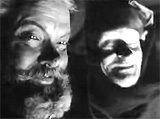
Sir John/Jack Falstaff (Orson Welles)
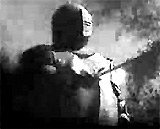
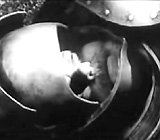
Falstaff's Heavily-Armored Participation in the Battle
of Shrewsbury

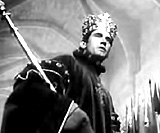
Falstaff Betrayed and Banished by Prince Hal/King
Henry V
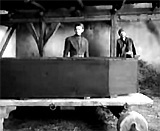
Falstaff in Coffin
|







